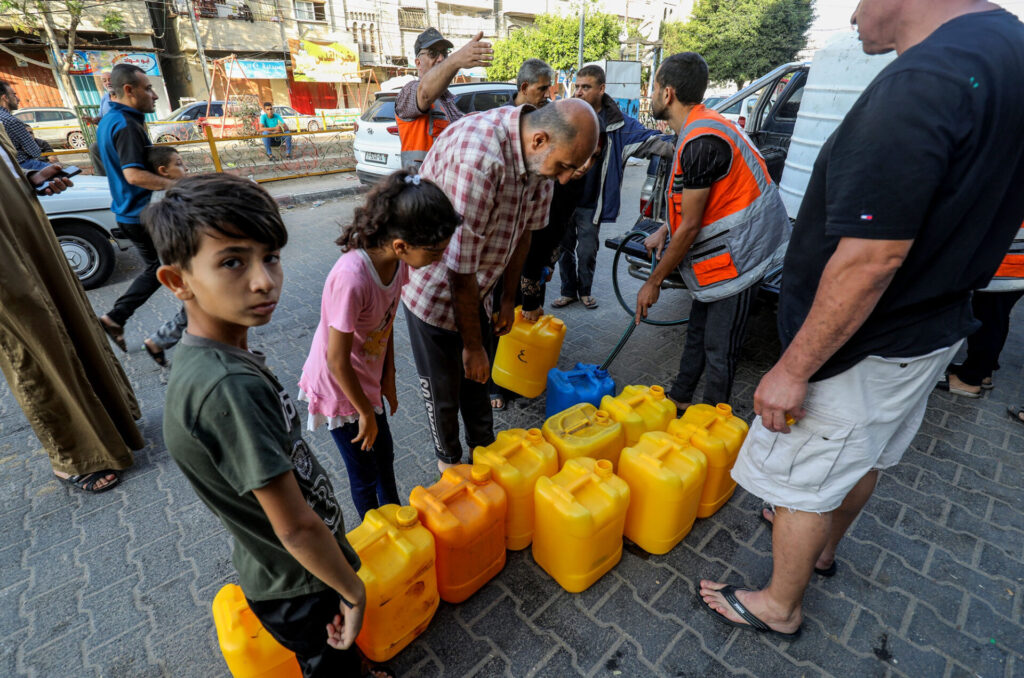Gaza’s Water Situation is Catastrophic
Water has been a chronic challenge in Gaza for many years, long before this devastating war.
Sixteen-plus years of hostilities and blockade have crippled the economy and reduced much of the region to desperate levels of poverty. These conditions are demonstrated most clearly in the inability of the Gaza’s people to secure reliable access to one of the most basic necessities of human existence: water.
Before the war, Gaza had virtually no potable water. The population has relied on a polluted and a rapidly depleting aquifer, and just a few desalination plants that fall short of meeting Gaza’s needs for potable water.
The war has made the already fragile water and sanitation system in Gaza virtually inoperable. UN reports estimate that people in Gaza now only have access to between two and three liters of water a day for all of their needs.


Drinking Water at Dangerously Low Levels
The availability of water in Gaza is hanging by a thread, with consumption plummeting to a meager two to three liters per capita per day for all needs. Before the war, Gaza’s residents purchased their water or accessed it from wells, the municipal water authority, desalination plants, and Israel. The war has removed the option of purchasing water, as there are no stocks for sale. On October 9, Israel cut off the water it sold to Gaza, and — despite agreeing to restore water a week later — only one water line, servicing eastern Khan Younis, was reactivated. The other sources of water depend on electricity to run facilities and pumps.
Dependence on Electrical Grid and Fuel
The desalination plants, which are critical to providing drinking water, rely heavily on energy from the electrical grid. Unfortunately, the grid is primarily powered by Israel – at 80% – with the Gaza power plant providing 20% of its electricity requirements. Israel cut off the supplies they were sending on October 7, the beginning of the war. Four days later, the Gaza power plant ran out of the fuel it needed to keep operating. To mitigate this challenge, the water desalination plants are equipped with standby generators, but the fuel shortage means the plants are operating at only about 30% capacity, as they use up the remaining fuel from their emergency stock.
Only Two of the Three Desalination Plants are Operating
Of the three desalination plants in Gaza, only two are only semi-operational as of this writing. These plants require 3,000 liters of fuel every 10 hours, each day, to meet the local demand for clean drinking water.
Water Distribution Challenges
Water tankers that distribute desalinated water rely on fuel, but low supplies make this means of delivery very difficult. And, while the pumping systems from the plants to the surrounding areas are sound, they still require fuel to operate them. To extend service to potential areas like Deir Al Balah, west Khan Younis, and Rafah, another 1,200 liters of fuel per day is needed for each area.
Wastewater Treatment Halted
Another devastating consequence of the complete blockade of Gaza is the shutdown of the wastewater treatment system. As a result, from the very beginning of the war, sewage pumping stations have been directing sewage into the sea through emergency sea outfalls, causing an environmental and sanitation disaster. The remaining domestic sewage is flooding streets and accumulating under debris, further compounding the sanitation crisis.
Healthcare Facilities Unable to Treat Patients
Healthcare facilities are struggling with a lack of water. With requests for tankered water ongoing, the situation remains precarious. Infections, diarrhea, fevers, and dehydration, particularly in children, are on the rise, painting a grim picture of the escalating humanitarian catastrophe in Gaza.
The situation in Gaza is nothing short of catastrophic. Large quantities of fuel must be among the aid being allowed into Gaza in order to ensure access to clean drinking water and to mitigate the devastating consequences on sanitation. Thankfully, today, Anera was able to locally procure and deliver 1,180 liters of fuel to the desalination plant in Beit Hanoun – enough to supply 800,000 liters of processed water to the area (see our response log). But this is a drop in the ocean. We need to rally urgent international support to prevent this humanitarian catastrophe from getting worse still.
Gaza’s people are counting on it.
OUR BLOG
Related
Part of a series on the impact of the war on all sectors of economic life within Gaza, Anera’s immediate response and plans for the future. Other posts cover housing, education, WASH, health and food production systems. Livelihood Recovery In Gaza, 57 years of occupation and…
InterAction and 50 Member CEOs, some of whom have organizations that work in Gaza, urge President Biden to take decisive and actionable steps to alleviate the humanitarian crisis in Gaza. Detailed within this letter are specific steps and commitments that…
